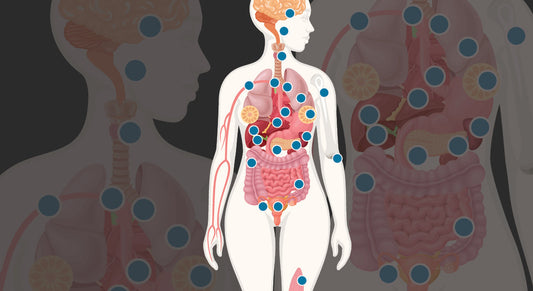Libido And Menopause – Nutrition For The Bedroom

Share
As we age, our libido can definitely need encouragement, especially as we enter and experience menopause.
Menopausal hormone changes often lead to decreased blood flow to the vagina and thinning of the tissue of the vulva, which can lead to increased pain and decreased sensitivity.
On top of these physiological changes, throw in the stress of juggling a job, parenting, and caring for aging parents… you may find that libido falls to the bottom of a long list of priorities.
Fortunately, there are some great nutritional “hacks” that you can use to prime your libido so that it is as healthy as possible.
Remember that for women, our libido starts in the brain – it is deeply connected with how we feel about ourselves, our bodies, and our relationships.
For this reason, it is important that our nutrition is “on point” so that our nervous system and female organs are functioning optimally. This is only made possible by a steady supply of blood flow and nutrients to these organs.
Multiple studies have shown that a diet heavy in processed, inflammatory foods: fried foods, high sugars, refined grains – (cheeseburger, fries and a soda) can sap your energy, lead to excess abdominal fat, and cause weight gain. All of this promotes a negative self-image and kills sexual desire. My advice? Avoid refined carbohydrates, such as white bread and pastries, french fries and other fried foods, soda, margarine, shortening, and lard.
How does nutrition affect the libido?
1) Fats affect nerve transmission
Healthy fats such as monounsaturated and polyunsaturated fats (especially those rich in omega-3 fatty acids) act as potent agents that support a normal inflammatory response and aid in supporting nerve transmission and neurotransmitter actions. Here are some of the best sources of healthy fat – I challenge you to consume at least one of these each day:*
- Olive, canola, peanut, and sesame oils
- Avocados
- Olives
- Nuts (almonds, peanuts, macadamia, hazelnuts, pecans, cashews)
- Peanut butter
- Sunflower, sesame, and pumpkin seeds
- Flaxseed
- Walnuts
- Fatty fish (salmon, tuna, mackerel, herring, trout, sardines) and fish oil
- Soybean and safflower oil
- Soymilk
- Tofu
2) Inflammation is libido-crushing
Support normal levels of body inflammation by filling up on food that is packed with natural properties and antioxidants. Many of these foods are also rich in fiber, which *BONUS* promotes a healthy gut.
Here are my top foods to naturally support a normal inflammatory response in your body:*
- dark green leafy vegetables
- tomatoes
- olive oil
- nuts like almonds and walnuts
- fatty fish like salmon, mackerel, tuna, and sardines
- whole fruits such as strawberries, blueberries, cherries, and oranges
3) Minerals get your blood rushing
Boost blood flow and support micro-circulation by eating plenty of foods rich in Vitamin C and Zinc. These minerals help maximize circulation to areas where we need it for libido.*
- berries
- leafy greens including kale and broccoli
- pumpkin seeds
- pine nuts
- red meat
- chickpeas
- spinach
- Cocoa also contains zinc, making dark chocolate, which is also rich in phytonutrients, a good option.
4) Vitamin B crushes stress and boosts your mood*
Enhance your mood by eating plenty of foods rich in B vitamins, which can combat feelings of depression, stress, lack of energy, or depression.
- pork
- poultry
- whole grains
- eggs and pulses
5) Vitamin D primes your hormones for stimulation*
Vitamin D is quickly becoming the star vitamin and must-have for women at our stage of life. It is extremely important for our overall health and promotes our immune system, blood pressure and even cholesterol… and you guessed it- increasing our sex drive!!*
Vitamin D deficiency can lower hormones which affect mood, sexual desire and performance. To improve mood and libido, I would advise taking a vitamin D supplement daily from October to April and for those who don’t spend much time outside throughout the year.*
6) Rev Up Your Neurotransmitters:*
Studies show that some foods rich in antioxidants, such as vitamin C and folate, and the intake of foods rich in the amino-acid arginine, enhance endothelial function by increasing nitric oxide synthesis, which is a potent vasodilator. Foods that meet these criteria are…
- Leafy greens like spinach and collard greens
- lentils
- kiwi, strawberries, and mango
- chocolate,
- Nuts like almonds, cashews, Brazil nut
- chicken
- beans
To feel energized, maintain dopamine levels omega 3-fatty acid rich food.*
- nuts
- salmon and tuna
- chia seeds.
Also increase your intake of foods high in the amino-acid tyrosine, which helps in the production of dopamine.
- avocado
- legumes
- dairy
Release stress and feel calmer by eating foods high in the amino-acid tryptophan, which assists in the production of serotonin.
- brown rice
- cottage cheese
- sesame seeds
- peanuts
7) Are you exercising?
Flexing your muscles makes them stronger. It also decreases belly fat, which is tied to some of the menopause vasomotor symptoms like night sweats and hot flashes. Exercise also induces the release of good feeling hormones right away and up to 24 hours after ending your workout. Exercise makes you stronger and leaner, which will immediately impact your self-esteem and confidence, and make you feel sexier.
The moral of the story is don’t feel ashamed if you are experiencing decreased libido as you enter or experience menopause. You are not alone and it is not your fault! We have all been there, but I hope you can incorporate some of these nutrition hacks into your daily routine to increase your sexual desire and drive!
To learn more about how you can use nutrition to curb some of the changes your body is going through as you age, check out The Galveston Diet Online Program.

















